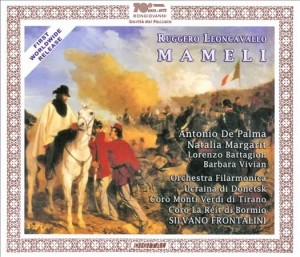Mameli, Leoncavallo’s penultimate opera, was the last that was performed during his lifetime, in 1916 in Genoa. At only 78 minutes (in two scenes) it is a tightly constructed piece of patriotic propaganda with an integrated love story. The title character, Goffredo Mameli (1827 – 1849), was an Italian poet and writer and a prominent figure in the Italian Risorgimento; he is the author of the lyrics of the Italian national anthem. He is one of the opera’s three main characters.
In the first scene, set in 1848 in Milan, Mameli, running from the authorities, hides in the home of Carlo Terzaghi where he and Carlo’s daughter, Delia, fall in love. Carlo is arrested but Mameli and Delia escape. A few months later (Scene 2), in June, 1849, all of the characters are in Rome, which has just become a Republic, rising up against the Church. A fourth character, a sympathetic Princess, works with the wounded. Terzaghi, Mameli, and Delia are reunited, and Mameli goes off to fight. He returns, mortally wounded, but in time to sing “Ahead, eagle of Rome, ahead! The beat of your wings will reach the whole world…” He is wrapped in the Italian flag and expires with Carlo, Delia, and the Princess comforting him.
This set presents a noisy opera, with singers and orchestra rarely attempting to play at less than full throttle. There really are no formal recits and arias; rather, exclamation leads to arioso, which leads to more lyrical moments: Mameli and Delia sing three duets throughout the opera. In fact, the work is constructed in such a way that the meeting of the pair at various times continues a love duet previously begun, sometimes with some similar music, with development.
Without being too critical, I must say that there are no major voices here; or rather, no truly pleasant voices. Tenor Antonio De Palma sings the title role, and it is a combination of Chenier, Canio, and Otello—very high, very loud, and textually important. De Palma manages it. Delia, for a bright young thing, also has some strenuous music to deal with, and the wobble in Natalia Margarit’s voice sounds as if she’s been dealing with it for centuries. (Pictures of her in the program reveal a young woman.) Lorenzo Battagion as Terzaghi is also expressive and his baritone is a fine instrument. Barbara Vivian’s Princess is sincere.
Silvano Frontalini leads the Ukranian/Albanian forces in, as suggested, a crude if exciting performance. The sound blares, but is more than acceptable. This release will be of interest to verismo fans and Leoncavallo completists. As in-your-face as it is, it still holds the attention.
































